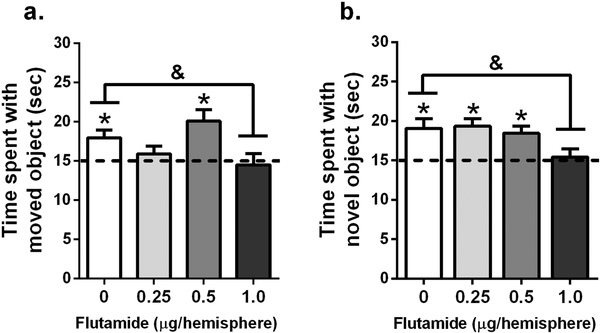Figure 2.
Infusion of flutamide into the dorsal hippocampus of intact males impaired memory consolidation in both tasks. (a) In the object placement task, mice infused with vehicle (n = 12) or 0.5 μg/hemisphere flutamide (n = 8) spent significantly more time with the moved object than chance (*p < 0.05). However, mice infused with 0.25 μg/hemisphere (n = 11) or 1.0 μg/hemisphere (n = 10) flutamide spent no more time than chance with the moved object, suggesting impairing effects of these doses. Mice infused with 1.0 μg/hemisphere flutamide also spent significantly less time with the moved object than those treated with vehicle (&p < 0.05). (b) In the object recognition task, mice infused with vehicle (n = 10), 0.25 μg/hemisphere (n = 8), or 0.5 μg/hemisphere (n = 9) of flutamide interacted with the novel object significantly more than chance (*p <0.05), whereas the mice treated with 1.0 μg/hemisphere flutamide (n = 9) did not. As in object placement, the time spent with the novel object differed significantly between mice treated with vehicle and 1.0 μg/hemisphere flutamide (&p < 0.05).

